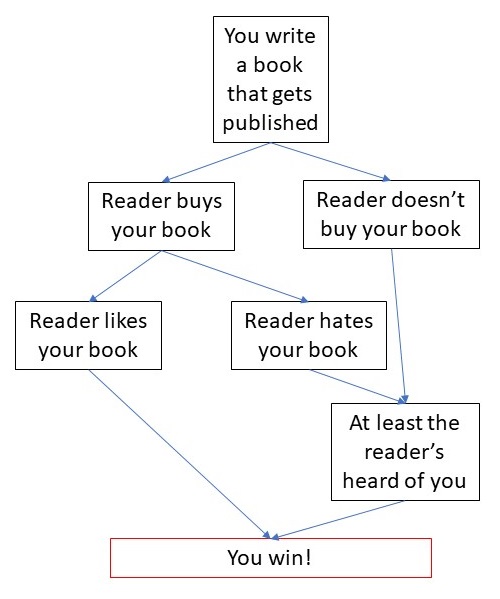If you write a book or short story and get it published, you win the game. In fact, no matter what happens, you can’t lose.
This situation is called the ‘Xanatos Gambit,’ named for David Xanatos, a fictional character (voiced by actor Jonathan Frakes) in the 1990’s Disney cartoon series, “Gargoyles.” It’s a logical construct where the plan’s creator benefits from every conceivable outcome, even from apparent failures. If I’m not mistaken, the idea of calling it the ‘Xanatos Gambit’ came, not from the show, but from the TV Tropes website.
Getting back to our hypothetical, you’ve written a book and it’s been published. Though it’s available for sale, it may not achieve commercial success, however you define that. Still, it’s almost a guarantee that at least one potential reader will come across the book’s cover, with its title and your name.
I’ll skip over the case where the reader buys, reads, and enjoys your book. That’s an obvious win for you.
However, the potential reader may ignore your book, attention flitting past to the next item of interest in the bookstore or the internet. Still, your name registers in the reader’s mind. Should that reader come across your name again, a memory is triggered, an association made. This might prod curiosity, and perhaps, eventually, the reader will buy your book or mention your name to another reader who will buy it. That’s a win for you.
Even if that reader ignores your book and never thinks of it again, your book is out there, available for sale. Other readers will see it. The odds are certain that at least one will buy your book, or another you’ve written. That’s a win.
If a reader buys your book, the reader may never read it. Still, it’s a sale and you earned some money. You win.
The reader may hate your book. Might write a damning review. Might tell friends and relatives never to buy anything written by you. Might popularize a “Hate [insert your name] Day,” a holiday dedicated to burning you in effigy or sticking pins in a voodoo doll replica of you. Even then, your book and your name achieve fame that rises above the common person. A win for sure.
There’s a tiny chance no one buys your book, ever. Still, though decades, centuries, and millennia will pass and you will die, you’ve left behind more than ashes in an urn or a stone in a cemetery. You’ve left behind something no storm can blow away, no flood can drown, no earthquake can swallow. You’re a published writer. Win.
Write that book, get it published, and win. Thanks to the Xanatos Gambit, you can’t lose, and neither can—
Poseidon’s Scribe



